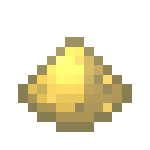

"The Party returns to the lair of their fallen Copper Dragon patron and finds 250,000 gp. In other words, coin or representation of money can be whatever the game wants, the gp is sort of the standard to give a universal sense of some baseline worth for goods and services. 2E they offered hacksilver as an alternative way to materially representing currency, but still used with the gp "mechanical" standard. Rather the term gp is an abstraction of value that can represents ingots/bars, letters of credits, paper printed money etc. Let's also keep in mind that the various denominations discussed in the PHB, particular at the "large" level aren't necessarily coins. It can also be created by smelting iron in a furnace (on older versions). Steel Ingots can be created by pouring Molten Steel into an Ingot Cast, and is interchangeable with the Steel Ingot from Artifice. It is used to create steel based items in a Tool Forge or by pouring molten steel into casts from a Smeltery. So whichever published setting makes a big deal of Electrum, it's just running with that inspiration to be a "different" world, tis all. Steel Ingot is an item added by Tinkers Construct. The idea that Electrum (and platinum) was otherworldly or past world currency is something put in as flavor inspiration sometime after 2E (if not conceived in 5e). There's a reason why the published campaign that makes frequent use of electrum is also the one that doesn't take place in the Forgotten Realms (or whatever world the players start out in).Įlectrum has been around since AD&D if not Red Box D&D. EP, GP, PP is high roller stuff for big deal trading and war finance. Copper and Silver are the main coins people do business in.
Electrum ingots Pc#
I don't bother with a sophisticated economy, but coin, ingots and gemstones used as currency are a thing in my game, sometimes a motivating factor for either PCs or "the big picture." So since money doesn't really matter all that much mechanically in 5e, it becomes more a story element, so to speak, that I introduce or a PC can propose.Įlectrum is there as presented in the books. Towns have similar systems but much less secure. Similar to Lyxen's Runequest note, some coins don't have currency in some parts of the world, but usually PCs can find someone willing to negotiate a bulk exchange rate where they're buying just the metal at a substantially reduced value, not the coin value, to be melted and reworked for other purposes. Cities also provide "banking" of a sort, PCs can even take work as a sort of Western Union and transport funds from one area to the next. Exchanging bulk lesser value coins into gold is largely something that can only be done in cities (and sometimes gives reason to go to cities). I just use the regular coin values, though I'll sometimes describe coins to give PCs a sense of their origins (lands they're familiar with, lands they've never seen before, inscriptions not of their plane of existence, etc). Monstrous Compendium Volume One: Spelljammer Creatures


 0 kommentar(er)
0 kommentar(er)
